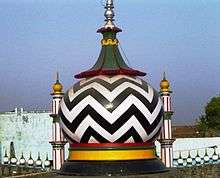Ahmad Saeed Kazmi
Syed Ahmad Saeed Kazmi (1913 – 4 June 1986, Urdu: سید احمد سعید کاظمی) was an Islamic scholar and Sufi living in Multan. He is known for his contribution to the Pakistan Movement, Urdu translation and explanation (Tafseer) of Quran, and Dars-e-Hadith. His tomb sits next to Multan's 18th century Shahi Eid Gah Mosque.
Education
Kazmi was six years old when his father died at the age of 39. Therefore, his eldest brother Muhammad Khalil Kazmi raised him. His mother initiated his education. His uncle later gave him Sanad-e-Hadith and Sufist education.
Books
Kazmi (رحمت اللہ علیہ) these books:
Milad un Nabi (صل أ لله عليه وسلم)
Tawhid or Shirk
Hayat un Nabi (صل أ لله عليه وسلم)
Gustakh e Rasool (صل الله عليه وسلم) ki Saza
Migration to Multan
Nafir Alam was a Sufi saint who used to celebrate the urs of Khawja Moin-ud-Din Chishti Ajmeri in Multan. He invited young Ahmad Saeed to debate in Multan. When he listened to his speech, he was impressed. So he continuously requested Ahmad Saeed to permanently shift to Multan. Therefore, Kazmi migrated to Multan in the early 1935.
In Multan, Kazmi started teaching in his own home near Tinan Wali Khoi. In November 1935 he started giving lectures in Masjid Hafiz Fateh Sher Outside Lohari Gate, which continued for 18 years. After that He started Dars-e-Hadith in Hazrat Chup Shah's Mosque and completed Mishkat al-Masabih followed by Sahih al-Bukhari.
In that era, Muslims of India were demanding independence and their major party was Muslim League. Ahmad Saeed was impressed by the Muslim League's program therefore he joined. In the area of Southern Punjab, he worked to spread political awareness among Muslims and to bring them to the platform of Muslim League. He never met with Muhammad Ali Jinnah, yet he was connected with him through mail.
On the request of nawab of Bahawalpur and nawab of Kalabagh Hazoor Ghazali e zaman accepted the post of Shaikh ul Hadith in Islamia university of Bahawalpur, and he taught there for long time.
See also
External links
- Audio Files
- Books by Kazmi at Kazmis.com
